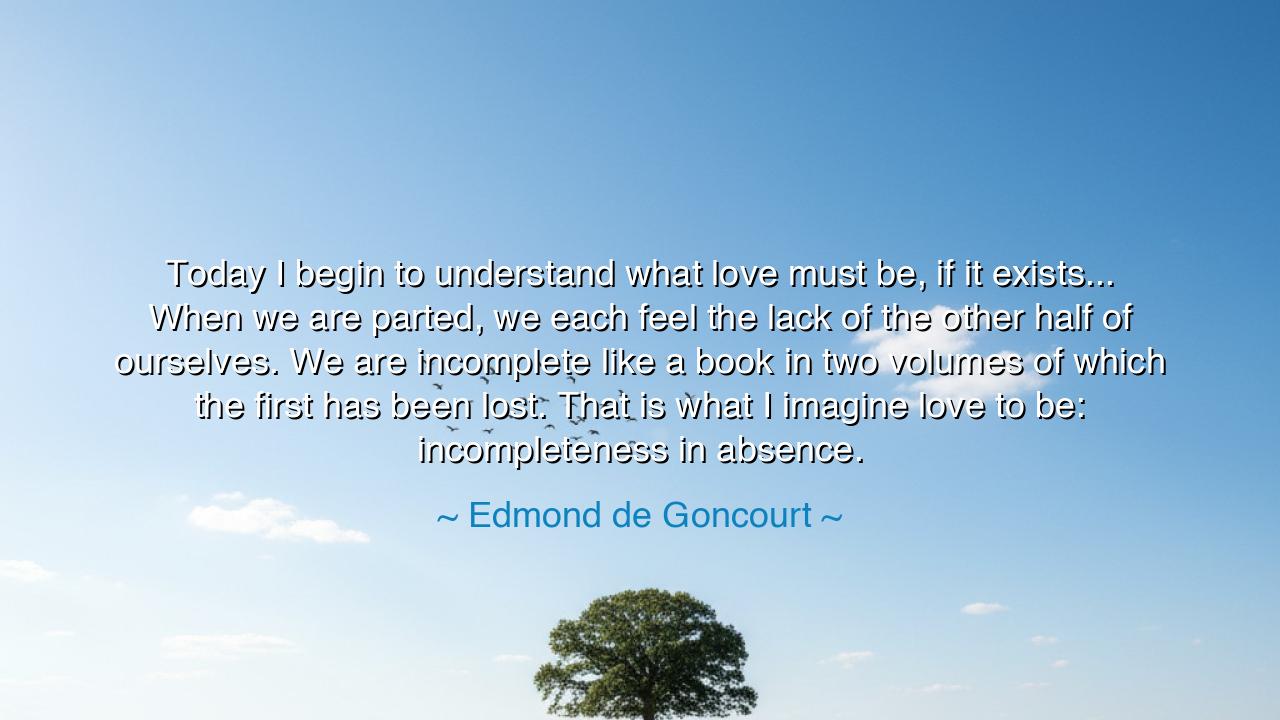
Today I begin to understand what love must be, if it exists...
Today I begin to understand what love must be, if it exists... When we are parted, we each feel the lack of the other half of ourselves. We are incomplete like a book in two volumes of which the first has been lost. That is what I imagine love to be: incompleteness in absence.






Edmond de Goncourt, in a moment of piercing clarity, declared: “Today I begin to understand what love must be, if it exists... When we are parted, we each feel the lack of the other half of ourselves. We are incomplete like a book in two volumes of which the first has been lost. That is what I imagine love to be: incompleteness in absence.” Here he gives shape to the ancient ache of the human heart—that love is not merely delight in another’s presence, but the torment of absence, the recognition that without the beloved, the soul itself is unfinished. Just as a book missing its first volume cannot tell its whole story, so too a soul without its counterpart cannot be fully itself.
The origin of this truth is as old as humanity. Plato’s Symposium speaks of men and women as once being whole beings, split apart by the gods, condemned to wander the earth in search of their lost halves. Goncourt, echoing this vision, casts love not as luxury but as necessity. To him, it is not the pleasant addition to life, but the other half of life itself. This is why he defines it through absence—for it is when we are parted from the beloved that we realize how essential they are, how bound up our very existence has become in theirs.
History testifies with countless examples. Think of Antony and Cleopatra, whose love was fierce enough to shake empires. Yet it was in their partings that the depth of their bond was most revealed. Separated, each felt not merely longing, but the tearing away of their very selves. For them, absence was not silence but agony, as if the story of their lives could not continue without the missing volume. Their tale, though tragic, shows the raw truth Goncourt describes: love is wholeness in union, but brokenness in separation.
Or consider John Keats and Fanny Brawne, the poet and his muse. Their love was bound by circumstance, disease, and distance. In his letters to her, Keats writes not merely of longing, but of feeling unmade in her absence. “I have two luxuries to brood over in my walks,” he confessed, “your loveliness and the hour of my death.” His words echo Goncourt’s vision—love as a book missing half its chapters, impossible to understand without the other. Keats’s greatness as a poet did not shield him from this truth; indeed, it sharpened his awareness that love is not fulfilled by presence alone, but defined by what is missing when the beloved is gone.
The deeper meaning is this: true love reshapes identity. It fuses two beings so that they are no longer whole apart. Where once stood two separate volumes, now there is one story told in two bindings. When separation comes, life itself feels fragmented, incomplete. This is why Goncourt imagines love as absence—because absence is the measure of love’s power. To miss someone with the force of incompleteness is to know you are no longer merely yourself; you are bound, your existence written together with another’s.
The lesson for us, O seekers of truth, is that love is not to be taken lightly. If you would open your soul to it, know that you will never again walk alone, nor ever again be entirely whole by yourself. It is both gift and burden, joy and sorrow, crown and cross. To love is to accept incompleteness in absence, yet fullness in presence. It is to allow your life to be rewritten as part of a greater story, one that cannot be told in isolation.
Practical wisdom follows: cherish those who have become part of your soul’s story. Do not let pride or neglect steal from you the volume that completes your life. When apart, remember that absence itself is a testimony—that the ache you feel is not weakness, but proof of love’s reality. Nurture this bond with care, with sacrifice, with daily acts of devotion, so that when you are together, the story is whole, and when you are apart, the missing chapters still point back to the beloved.
Thus Edmond de Goncourt’s words endure like an ancient oracle: love is incompleteness in absence. To love is to find one’s missing half; to be parted is to live as a book unfinished. Let us, therefore, love bravely, with full knowledge of its cost, for the story of a soul is never complete until it is written with another.






AAdministratorAdministrator
Welcome, honored guests. Please leave a comment, we will respond soon